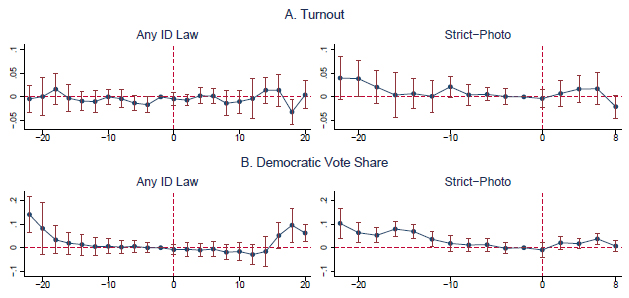Tyler Cowen points us this morning to a new paper by Enrich Cantoni that uses county-level administrative data from 1992 to 2014 to estimate the effect of voter ID laws. Here’s the nut of it:

In other words, voter ID laws of all kinds have almost no effect on voter turnout and almost no effect on Democratic vote share:
The estimated average effects on turnout are fairly precise zeros. The implementation of an ID law of any type is associated, on average, with an insignificant .4 percentage point increase in voter turnout. Likewise, strict-photo ID laws induce an insignificant .5 percentage point decrease in county-level voter participation .
This tracks pretty well with previous research, which suggests that photo ID laws have a very modest effect. But why? Is it because they’re just ineffective, or because they piss off Democrats, who then mount an extra strong GOTV push? I don’t think anyone knows.
It’s worth pointing out that although reduced participation—even 0.5 percentage points—is a good reason to oppose strict photo ID laws, it’s never been the main reason. The main reason is that these laws are aimed very precisely at African-American and Hispanic voters. Is this because of crude racism? Or are blacks and Hispanics just collateral damage in an effort to hurt Democrats? It doesn’t matter. For reasons that should be too obvious to need pointing out, any voting law that has an outsized impact on black voters—accidental or not—deserves the very strictest scrutiny. If there were a truly pressing justification for photo ID laws, maybe you’d allow it. But voter fraud is virtually nonexistent, and reducing the Democratic vote is obviously not a very pressing justification. No court should allow this kind of thing.

















